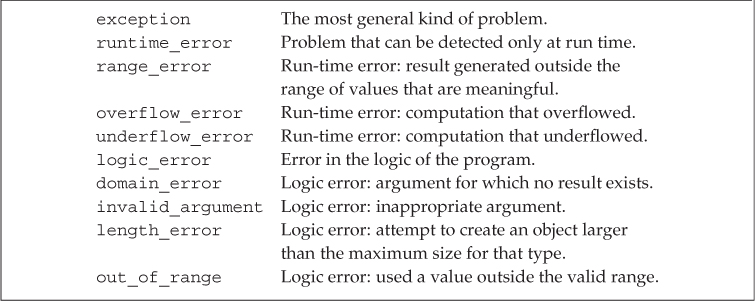 5.6.3. Standard Exceptions
by Barbara E. Moo, Josée Lajoie, Stanley B. Lippman
C++ Primer, Fifth Edition
5.6.3. Standard Exceptions
by Barbara E. Moo, Josée Lajoie, Stanley B. Lippman
C++ Primer, Fifth Edition
- Title Page
- Copyright Page
- Dedication Page
- Contents
- New Features in C++11
- Preface
- Chapter 1. Getting Started
- Part I. The Basics
- Contents
- Chapter 2. Variables and Basic Types
- Chapter 3. Strings, Vectors, and Arrays
- Chapter 4. Expressions
- Contents
- 4.1. Fundamentals
- 4.2. Arithmetic Operators
- 4.3. Logical and Relational Operators
- 4.4. Assignment Operators
- 4.5. Increment and Decrement Operators
- 4.6. The Member Access Operators
- 4.7. The Conditional Operator
- 4.8. The Bitwise Operators
- 4.9. The sizeof Operator
- 4.10. Comma Operator
- 4.11. Type Conversions
- 4.12. Operator Precedence Table
- Chapter Summary
- Defined Terms
- Chapter 5. Statements
- Chapter 6. Functions
- Chapter 7. Classes
- Part II. The C++ Library
- Contents
- Chapter 8. The IO Library
- Chapter 9. Sequential Containers
- Chapter 10. Generic Algorithms
- Chapter 11. Associative Containers
- Chapter 12. Dynamic Memory
- Part III. Tools for Class Authors
- Contents
- Chapter 13. Copy Control
- Chapter 14. Overloaded Operations and Conversions
- Contents
- 14.1. Basic Concepts
- 14.2. Input and Output Operators
- 14.3. Arithmetic and Relational Operators
- 14.4. Assignment Operators
- 14.5. Subscript Operator
- 14.6. Increment and Decrement Operators
- 14.7. Member Access Operators
- 14.8. Function-Call Operator
- 14.9. Overloading, Conversions, and Operators
- Chapter Summary
- Defined Terms
- Chapter 15. Object-Oriented Programming
- Contents
- 15.1. OOP: An Overview
- 15.2. Defining Base and Derived Classes
- 15.3. Virtual Functions
- 15.4. Abstract Base Classes
- 15.5. Access Control and Inheritance
- 15.6. Class Scope under Inheritance
- 15.7. Constructors and Copy Control
- 15.8. Containers and Inheritance
- 15.9. Text Queries Revisited
- Chapter Summary
- Defined Terms
- Chapter 16. Templates and Generic Programming
- Part IV. Advanced Topics
- Contents
- Chapter 17. Specialized Library Facilities
- Chapter 18. Tools for Large Programs
- Chapter 19. Specialized Tools and Techniques
- Appendix A. The Library
- Contents
- A.1. Library Names and Headers
- A.2. A Brief Tour of the Algorithms
- A.2.1. Algorithms to Find an Object
- A.2.2. Other Read-Only Algorithms
- A.2.3. Binary Search Algorithms
- A.2.4. Algorithms That Write Container Elements
- A.2.5. Partitioning and Sorting Algorithms
- A.2.6. General Reordering Operations
- A.2.7. Permutation Algorithms
- A.2.8. Set Algorithms for Sorted Sequences
- A.2.9. Minimum and Maximum Values
- A.2.10. Numeric Algorithms
- A.3. Random Numbers
- Index
- Add Pages
5.6.3. Standard Exceptions
The C++ library defines several classes that it uses to report problems encountered in the functions in the standard library. These exception classes are also intended to be used in the programs we write. These classes are defined in four headers:
• The exception header defines the most general kind of exception class named exception. It communicates only that an exception occurred but provides no additional information.
• The stdexcept header defines several general-purpose exception classes, which are listed in Table 5.1.
Table 5.1. Standard Exception Classes Defined in <stdexcept>

• The new header defines the bad_alloc exception type, which we cover in § 12.1.2 (p. 458).
• The type_info header defines the bad_cast exception type, which we cover in § 19.2 (p. 825).
The library exception classes have only a few operations. We can create, copy, and assign objects of any of the exception types.
We can only default initialize (§ 2.2.1, p. 43) exception, bad_alloc, and bad_cast objects; it is not possible to provide an initializer for objects of these exception types.
The other exception types have the opposite behavior: We can initialize those objects from either a string or a C-style string, but we cannot default initialize them. When we create objects of any of these other exception types, we must supply an initializer. That initializer is used to provide additional information about the error that occurred.
The exception types define only a single operation named what. That function takes no arguments and returns a const char* that points to a C-style character string (§ 3.5.4, p. 122). The purpose of this C-style character string is to provide some sort of textual description of the exception thrown.
The contents of the C-style string that what returns depends on the type of the exception object. For the types that take a string initializer, the what function returns that string. For the other types, the value of the string that what returns varies by compiler.
Exercises Section 5.6.3
Exercise 5.23: Write a program that reads two integers from the standard input and prints the result of dividing the first number by the second.
Exercise 5.24: Revise your program to throw an exception if the second number is zero. Test your program with a zero input to see what happens on your system if you don’t catch an exception.
Exercise 5.25: Revise your program from the previous exercise to use a try block to catch the exception. The catch clause should print a message to the user and ask them to supply a new number and repeat the code inside the try.
-
No Comment